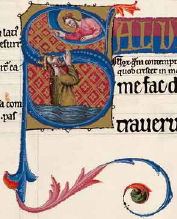Psalm 69



The 69th psalm (according to Greek counting the 68th) is a psalm of David in the Bible and belongs in the series of lamentations of an individual.
Dating
The psalm can be assigned to the Maccabean period. This is what Theodor von Mopsuestia wrote in the 5th century commentary on psalms :
"This song was written in a prophetic spirit at the time of the Maccabees and the prayer fits the people and events of that time."
This historical background is the desecration of the temple combined with the destruction of Jerusalem and the wreaking of a blood bath. The psalm is also related to other psalms from this period.
structure
The psalm can be structured as follows:
- Verses 1-13: shaped by lament (part 1)
- Verse 2a: Introductory cry for help
- Verses 2b – 5: Lament
- Verse 6: Confession of sin
- Verse 7: Please
- Verses 8-13: Another complaint
- Verses 14-19: shaped by request and desire (part 2)
- Verses 20-29: the enemies (part 3)
- Verses 20–22: Shame and mercilessness that they do to him
- Verses 23-29: Curses on the enemy
- Verses 30-37: return to yourself (part 4)
- Verse 30: Desire for YHWH's protection
- Verses 31–32: Pledge to sing the song of thanksgiving when answered
- Verses 33–37: intoning the thanksgiving song beforehand
Thematic focus
The enemies form an important thematic focus (vv. 5, 13, 15, 19–29). Typical enemy terms overall are
- אֹיֵב (enemy)
- צֹרֵר (adversary)
- שֹׂנֵא (hater)
- רֹדֵף (persecutor)
- רְשָׁעִים (wicked)
- ...
Ps 69 is initially about the motif of sinking . Then the enemies quickly come into play. Water masses / mud and enemies are complementary images for the hardship in which the praying ego finds itself (cf. vv. 2-5). The following sections deal more with the connection between shame / dishonor and enemies. Shame / shame / mockery is a classic theme of lamentations, especially of the individual, but also of the people. One's own humiliation turns into the wish that the enemies will also be shamed (cf. v. 20ff). Shame develops above all towards "significantly other people", that is towards others who mean a lot to themselves (cf. vv. 9 + 13). In v. 10 the shaming of God and that of the praying self coincide - God and I form a kind of community of fate. Mockery is such a profound shame that it is called a quasi-fatal disease (v. 20f, cf. also Ps 42:11), which captures the phenomenon of social death. Similar evaluations can be found in rabbinical literature :
"Anyone who makes the face of a companion pale in front of the crowd is as if he is shedding blood ... for I have seen how the blush goes and the paleness comes" Bawa mezia 58, b
The mockery of people ultimately hits God himself and is therefore all the more serious.
"Anyone who publicly insults a fellow man leads himself to eternal life: a public insult is the desecration of the likeness of God, according to which every human being is created ... That is why the offense of an individual person is a degradation of all humanity." Netivoth Olam XII
“Whoever mocks the poor mocks their creator; and he who rejoices in another's misfortune will not go unpunished. ”Prov 17,5
In the Old Testament, however, “honor” (כָבוֹד) as a counter-term to shame is not fought for competitively, but is given to human beings as human beings without any preconditions in their being (cf. Ps 8,6) and would probably be better in these contexts with “dignity “To play.
Individual evidence
- ^ Translation see: Christina Metzdorf, Die Tempelaktion Jesu (2003), 91
- ↑ Ferdinand Hitzig, The Psalms historically-critically examined (1853), 132f.
- ^ Hermann Gunkel, Die Psalmen ( 6 1986), 295
Web links
- Psalm 69 in the standard translation , the Luther Bible and other translations from bibleserver.com
- Psalm 69 in the Biblia Hebraica Stuttgartensia (BHS) on bibelwissenschaft.de
- Sheet music in the public domain of settings for Psalm 69 in the Choral Public Domain Library - ChoralWiki (English)
